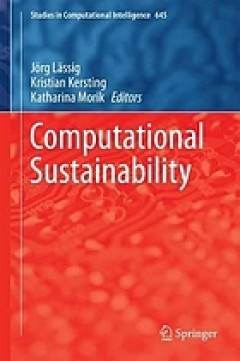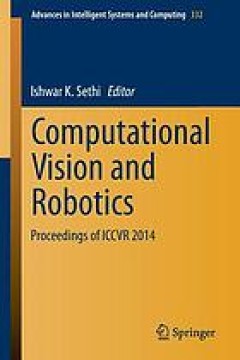Filter by

Computational sustainability
The book at hand gives an overview of the state of the art research in Computational Sustainability as well as case studies of different application scenarios. This covers topics such as renewable energy supply, energy storage and e-mobility, efficiency in data centers and networks, sustainable food and water supply, sustainable health, industrial production and quality, etc. The book describes…
- Edition
- -
- ISBN/ISSN
- 9783319318585
- Collation
- vi, 276 pages
- Series Title
- -
- Call Number
- 004

Computational vision and robotics : proceedings of ICCVR 2014
Computer Vision and Robotic is one of the most challenging areas of 21st century. Its application ranges from Agriculture to Medicine, Household applications to Humanoid, Deep-sea-application to Space application, and Industry applications to Man-less-plant. Today's technologies demand to produce intelligent machine, which are enabling applications in various domains and services. Robotics is o…
- Edition
- -
- ISBN/ISSN
- 9788132221968
- Collation
- xiii, 232 pages
- Series Title
- -
- Call Number
- 004

Computational and experimental biomedical sciences : methods and applications…
This book contains the full papers presented at ICCEBS 2013? the 1st International Conference on Computational and Experimental Biomedical Sciences, which was organized in Azores, in October 2013. The included papers present and discuss new trends in those fields, using several methods and techniques, including active shape models, constitutive models, isogeometric elements, genetic algorithms,…
- Edition
- -
- ISBN/ISSN
- 9783319157993
- Collation
- -
- Series Title
- -
- Call Number
- -

Computational and Statistical Epigenomics
This book introduces the reader to modern computational and statistical tools for translational epigenomics research. Over the last decade, epigenomics has emerged as a key area of molecular biology, epidemiology and genome medicine. Epigenomics not only offers us a deeper understanding of fundamental cellular biology, but also provides us with the basis for an improved understanding and manage…
- Edition
- -
- ISBN/ISSN
- 9789401799270
- Collation
- -
- Series Title
- -
- Call Number
- 004

Computer aided seismic and fire retrofitting analysis of existing high rise r…
This book details the analysis and design of high rise buildings for gravity and seismic analysis. It provides the knowledge structural engineers need to retrofit existing structures in order to meet safety requirements and better prevent potential damage from such disasters as earthquakes and fires. Coverage includes actual case studies of existing buildings, reviews of current knowledge for d…
- Edition
- -
- ISBN/ISSN
- 9789401772976
- Collation
- -
- Series Title
- -
- Call Number
- 004

Computer Aided Surgery
This book presents the latest research advances in the theory, design, control, and application of robot systems intended for a variety of purposes such as manipulation, manufacturing, automation, surgery, locomotion, and biomechanics. Several chapters deal with fundamental kinematics in nature, including synthesis, calibration, redundancy, force control, dexterity, inverse and forward kinemati…
- Edition
- -
- ISBN/ISSN
- 9784431558101
- Collation
- xii, 148 pages
- Series Title
- -
- Call Number
- 004

Computer Aided Systems Theory – EUROCAST 2015 15th International Conference…
This volume constitutes the papers presented at the 15th International Conference on Computer Aided Systems Theory, EUROCAST 2015, held in February 2015 in Las Palmas de Gran Canaria, Spain. The total of 107 papers presented were carefully reviewed and selected for inclusion in the book. The contributions are organized in topical sections on Systems Theory and Applications; Modelling Biological…
- Edition
- -
- ISBN/ISSN
- 9783319273402
- Collation
- xviii, 887 pages
- Series Title
- -
- Call Number
- 004

Computer aided verification : 27th International Conference, CAV 2015, San Fr…
The two-volume set LNCS 9206 and LNCS 9207 constitutes the refereed proceedings of the 27th International Conference on Computer Aided Verification, CAV 2015, held in San Francisco, CA, USA, in July 2015. The total of 58 full and 11 short papers presented in the proceedings was carefully reviewed and selected from 252 submissions. The papers were organized in topical sections named: model check…
- Edition
- -
- ISBN/ISSN
- 9783319216683
- Collation
- xviii, 469 pages
- Series Title
- -
- Call Number
- 004

Computer aided verification : 27th International Conference, CAV 2015, San Fr…
The two-volume set LNCS 9206 and LNCS 9207 constitutes the refereed proceedings of the 27th International Conference on Computer Aided Verification, CAV 2015, held in San Francisco, CA, USA, in July 2015. The total of 58 full and 11 short papers presented in the proceedings was carefully reviewed and selected from 252 submissions. The papers were organized in topical sections named: model check…
- Edition
- -
- ISBN/ISSN
- 9783319216904
- Collation
- xxiii, 677 pages
- Series Title
- -
- Call Number
- 004

Computer Aided Virtual Manufacturing Using Creo Parametric: Easy to Learn Ste…
Providing a step-by-step guide for the implementation of virtual manufacturing using Creo Parametric software (formerly known as Pro-Engineer), this book creates an engaging and interactive learning experience for manufacturing engineering students. Featuring graphic illustrations of simulation processes and operations, and written in accessible English to promote user-friendliness, the book co…
- Edition
- -
- ISBN/ISSN
- 9783319233598
- Collation
- l, 640 pages
- Series Title
- -
- Call Number
- 004
 Computer Science, Information & General Works
Computer Science, Information & General Works  Philosophy & Psychology
Philosophy & Psychology  Religion
Religion  Social Sciences
Social Sciences  Language
Language  Pure Science
Pure Science  Applied Sciences
Applied Sciences  Art & Recreation
Art & Recreation  Literature
Literature  History & Geography
History & Geography